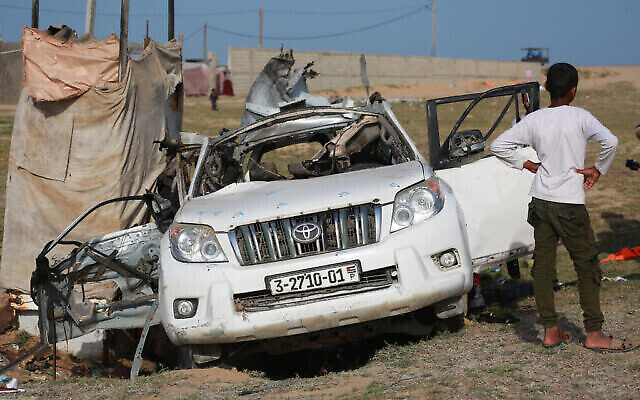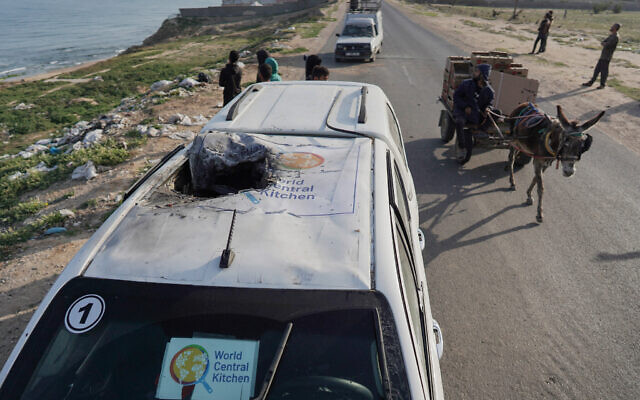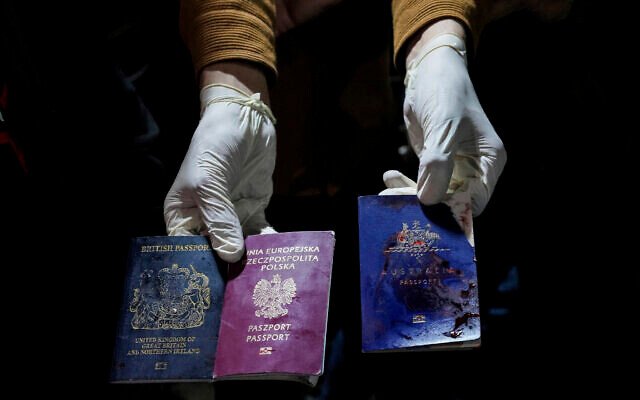Israel acknowledges killing 7 aid charity workers in ‘tragic, unintentional’ airstrike
World Central Kitchen halts Gaza ops after ‘unforgivable’ Israeli bombing; victims’ countries demand answers; PM says will ‘do everything’ to prevent recurrence; White House ‘heartbroken’.

(THE TIMES OF ISRAEL) Facing searing criticism on Tuesday, Israel acknowledged mistakenly carrying out an airstrike that killed seven staff members of a US-based charity group who were unloading food brought by sea to the war-torn Gaza Strip.
The group World Central Kitchen said it was pausing operations after a “targeted Israeli strike” at around midnight between Monday and Tuesday killed three British and four other staffers — an Australian, a Palestinian, a Pole and a US-Canadian.
Prime Minister Benjamin Netanyahu acknowledged a “tragic” and “unintentional” incident and vowed to “do everything” to prevent a recurrence.
The Israeli military promised to investigate the incident “at the highest levels.”
A Haaretz report on Tuesday afternoon said the IAF had fired three missiles in quick succession at three vehicles.
IDF Spokesman Rear Adm. Daniel Hagari said in an English-language statement that he had spoken to WCK founder Chef Jose Anders, “and expressed the deepest condolences of the Israel Defense Forces to the families and the entire World Central Kitchen family.”
He added that the IDF had expressed “sincere sorrow to our allied nations who have been doing and continue to do so much to assist those in need. We have been reviewing the incident at the highest levels to understand the circumstances of what happened and how it happened,” he said.
“We will get to the bottom of this and we will share our findings transparently,” Hagari added.
WCK has been working to unload food brought to Gaza by sea from Cyprus amid a push to increase aid to the Strip amid increasing fears of widespread famine. The killing of its aid workers compounds already intense criticism Israel has faced including accusations that it was withholding aid from the hunger-stricken region.
The White House was “heartbroken,” US National Security Council spokesperson Adrienne Watson wrote on X, stressing that relief workers “must be protected as they deliver aid that is desperately needed.”
“I am heartbroken and appalled that we — World Central Kitchen and the world — lost beautiful lives today because of a targeted attack by the IDF,” WCK’s CEO Erin Gore said.
“This is not only an attack against WCK, this is an attack on humanitarian organizations showing up in the most dire of situations where food is being used as a weapon of war,” she added. “This is unforgivable.”
The bodies of the aid workers killed were taken to a hospital mortuary in the central Gaza town of Deir al-Balah, an AFP photographer reported. One of them was laid on a makeshift stretcher, wearing a top emblazoned with the WCK name and logo.

The aid group said the team had been traveling in a “de-conflicted” area in a convoy of “two armored cars branded with the WCK logo and a soft skin vehicle” at the time of the strike.
“Despite coordinating movements with the (Israeli army), the convoy was hit as it was leaving the Deir al-Balah warehouse, where the team had unloaded more than 100 tons of humanitarian food aid brought to Gaza on the maritime route,” it said.
The three vehicles were targeted over a distance of around 2 kilometers.
According to a report by the Haaretz daily, a Hermes 450 UAV fired three missiles at the convoy in quick succession despite the vehicles being clearly marked on their roof as being part of WCK. The decision was made by a unit guarding the aid transport route after troops earlier spotted what appeared to be an armed figure riding on a truck that entered an aid storage area with three WCK cars. The attack occurred moments after the three cars left the storage area, leaving the truck and the armed figure behind, according to the report.
After a missile hit one car, those inside evacuated to the other two cars, and managed to report they had been attacked before a second missile hit another car. As the last unharmed car approached to evacuate the wounded, a third missile hit. All seven people who had been in the vehicles were killed, Haaretz reported.
IDF Spokesman Hagari said in his video statement that the IDF’s General Staff Fact-Finding Assessment Mechanism — an independent military body responsible for investigating unusual incidents amid the war — would probe the “serious incident.”
“This will help us reduce the risk of such an event from occurring again,” he said.
“For the last few months, the IDF has been working closely with the World Central Kitchen to assist them in fulfilling their noble mission of helping bring food and humanitarian aid to the people of Gaza. WCK also came to help Israelis after the massacre of October 7th; they were one of the first NGOs here,” Hagari continued. “The work of WCK is critical; they are on the frontlines of humanity,” he said.
The IDF acknowledged to The Times of Israel that it had carried out the strike, although it said it did not know the full circumstances yet. Regardless, the IDF said the strike was a serious incident that should not have happened.
An initial IDF probe into the incident was expected to be released to the public in the coming days, as the General Staff Fact-Finding Assessment Mechanism carries out a more in-depth investigation.
IDF Chief of Staff Lt. Gen. Herzi Halevi was personally involved in the military’s response to the incident, including updating the head of the US Central Command on the strike.
Halevi was due to meet Tuesday with the head of the IDF Southern Command, Maj. Gen. Yaron Finkelman, at the unit’s base in Beersheba, to be briefed on the military’s initial probe into the strike.
The chief of staff was also set to inaugurate a new joint command center with the Defense Ministry’s Coordination of Government Activities in the Territories (COGAT), aimed at better coordinating the humanitarian activity in the Gaza Strip.

Netanyahu said that the IDF “unintentionally” killed the seven aid workers.
“Unfortunately, in the last day there was a tragic case of our forces unintentionally hitting innocent people in the Gaza Strip,” he said as he left a hospital in Jerusalem after a hernia operation.
“It happens in war; we will investigate it right to the end… We are in contact with the governments, and we will do everything so that this thing does not happen again,” he said.
The president of the city of Przemysl, in southeastern Poland, identified the Polish WCK volunteer who was killed as Damian Sobol.
Poland’s foreign minister Radoslaw Sikorski wrote on X that he had asked the Israeli ambassador in Warsaw for “urgent explanations.”
“He assured me that Poland would soon receive the results of the investigation into this tragedy. I join in my condolences to the family of our brave volunteer and all civilian victims in the Gaza Strip,” Sikorski said.
The Polish foreign ministry posted on X that “Poland objects to the disregard for international humanitarian law and the protection of civilians, including humanitarian workers.”
Australian Prime Minister Anthony Albanese named the slain Australian aid worker as 44-year-old Lalzawmi “Zomi” Frankcom, and said his government had contacted Israel to demand that those responsible be held accountable.
“This is a human tragedy that should never have occurred, that is completely unacceptable and Australia will seek full and proper accountability,” he told a press conference on Tuesday.
Albanese said innocent civilians and humanitarian workers needed to be protected and reiterated his call for a sustainable ceasefire in Gaza along with more aid to help those suffering from “tremendous deprivation.”
EU foreign policy chief Josep Borrell wrote on X, “I condemn the attack and urge an investigation. Despite all the demands to protect civilians and humanitarian workers, we see new innocent casualties,” adding that the incident further strengthens the need for an immediate ceasefire.
The president of Cyprus, from where WCK sent aid to the Gaza Strip, on Tuesday called for an immediate probe into the killing of the organization’s workers.
“We need to double down on efforts to get aid to Gaza,” Nikos Christodoulides said, after a meeting with European Parliament President Roberta Metsola, telling reporters the maritime corridor for aid from his country to Gaza would continue to operate.
After visiting the Jabal al-Hussein Palestinian refugee camp in Amman, Jordan, on Tuesday, Spanish premier Pedro Sanchez said: “I hope and demand that the Israeli government clarifies as soon as possible the circumstances of this brutal attack that has taken the lives of seven aid workers who were doing nothing more than helping.”
Founded by Spanish-American celebrity chef José Andrés in the wake of the 2010 Haiti earthquake, WCK is one of the largest charities working in Gaza. An apolitical group, it has earned the appreciation of Israel’s government for its help with Israelis displaced after October 7. It has been a trailblazer in transferring aid into Gaza, going so far as to construct an improvised pier out of debris on which to land supplies for the embattled enclave.
Israel has faced intense international pressure to ensure more aid gets into the Strip, especially hard-to-reach areas of northern Gaza, amid repeated warnings that the population faces starvation and famine.
Jacob Magid contributed to this report.

comments